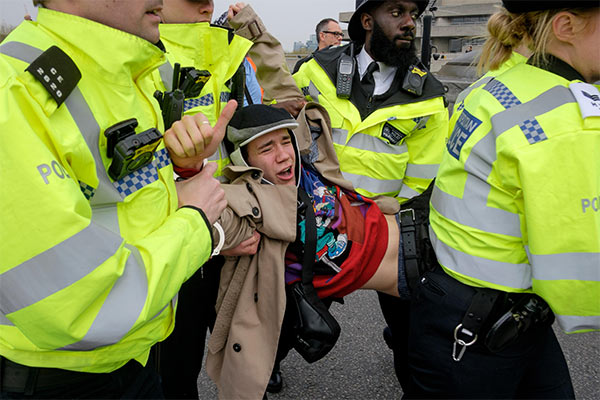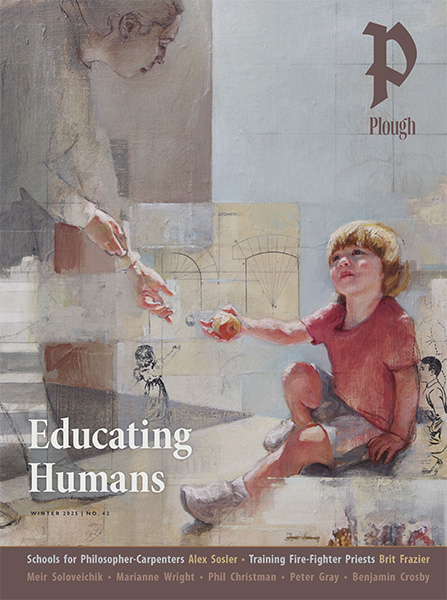Subtotal: $
Checkout
How to Be a Climate-Change Activist without Becoming an Alarmist
Drama and immediacy galvanize attention, but apocalyptic claims make many people feel there’s no hope.
By Alastair McIntosh
May 2, 2022
Available languages: español
Climate-change deniers have strategies, conscious or unconscious, that attempt to undermine the science by casting doubt on its findings. These serve to reduce what psychologists call “cognitive dissonance” – the clash between our image of the kind of people we think we are and how we actually live. Denialism avoids reality by sowing doubts about facts and consequences, undermining people’s sense of agency, or encouraging the ascription of responsibility away from ourselves as consumers by, for example, blaming “too many Indians and Chinese.”
Climate-change denial is now well studied; there’s work on industry-funded political maneuvering and on the psychology of people’s responses to climate change. In recent years, though, after doing much damage, voices of denial have been diminished. Headline-catching claims that global warming isn’t real or isn’t caused by burning coal, oil, and gas have hit a wall of overwhelming data and lived experience. One such denier, Peter Taylor, an ecologist whose 2009 book Chill said we were at the turning point toward the next ice age, told me ten years later that he’d set the onset back another “three to four hundred years.”
But, irony of ironies, another unexpected front has opened in the politics of climate change. Across the aisle from deniers are a number of alarmists who exaggerate the science for reasons that can combine fear, a poor understanding of how science works, personal psychological needs, and misguided attempts to grab attention for the good of the cause.

London Metropolitan Police officers arrest an activist participating in an Extinction Rebellion demonstration on Waterloo Bridge, April 2019 Mark Phillips / Alamy
James Lovelock, the now-102-year-old creator of the Gaia hypothesis – that life on earth regulates atmospheric conditions for its own perpetuation – was an early alarmist. In 2008, he told an interviewer that by 2100, he expected some 80 percent of the human population to have been wiped out by climate change. You’ve heard of Armageddon, he said, “but this is the real thing.”
Four years after his prediction, Lovelock realized that he’d overshot the mark. He’d had good intentions, but as he candidly conceded, he’d been “alarmist.” He’d spoken as “an independent and a loner,” had “made a mistake,” and had been “extrapolating too far.”
We only know what we know about climate change because of the climate science. Because climate change is a profoundly compound issue, it involves many specialist disciplines – astronomy, atmospheric physics, oceanography, glaciology, methane biology, forest ecology, sociology, and politics. The UN’s Intergovernmental Panel on Climate Change, the IPCC, has a range of expert working groups that synthesize thousands of studies into what I call “consensus expert science.” Consensus, because many heads are needed to give balance. Expert, because you don’t ask your car mechanic to do your dentistry. And science, because it is based in evidence, not whim or fancy.
But drama and immediacy galvanize attention. Others picked up the dropped alarmist baton. In 2018 Jem Bendell, an English business school professor with a background in Bitcoin and later an outspoken critic of Covid public health measures, built a movement called Deep Adaptation. His paper by this title failed academic peer review but achieved more than half a million downloads from his website. In predicting the “inevitable near-term social collapse” of most societies within ten years because of “runaway climate change,” his references nod toward American ecology professor, Guy McPherson, whose own claim to fame is predicting human extinction by the year 2026.
Bendell helped to fuel alarmism in the protest movement Extinction Rebellion, the co-founder of which, Roger Hallam, tells his followers to expect six to seven billion people dead because of climate change “within the next generation or two.” It was all a bit too much for some of Extinction Rebellion’s young climate-scientist activists. In 2020, several of them published a stinging riposte, arguing that Bendell’s claims of inevitable near-term social collapse “is not only wrong – it undermines the cause of the climate movement.”
And there’s the rub. “Good scientists aren’t alarmists,” says Professor Michael Mann, one of the world’s most prominent climate scientists. But “our message may be – and in fact is – alarming. … The distinction is so very, very critical and cannot be brushed under the rug.” In a Twitter exchange on “doomism” with Mann and Katharine Hayhoe, now chief scientist to The Nature Conservancy, I spoke of feeling “racked between the deniers and the alarmists.” Hayhoe answered, “It’s a narrow and lonely place, so great to have company!” And as Mann says in his recent book, The New Climate War, “Make no mistake: climate doom porn does sell.”
So how does alarmism that radically exceeds the already alarming mainstream science undermine the climate cause? It does so in several ways. It makes many feel there’s no hope. This suits the fossil fuel interests – if the crisis is irreversible we might as well just party on. It also panders to the geoengineers who would try to modify the climate of the earth by massive technical interventions such as mirrors out in space to dim the sunlight. Again, that sanctions partying on. More seriously, both denial and alarmism take us out of truth; they undermine the very principle.
Denial is a waste of time, but alarmism is a theft of time. It focuses all our thinking on the short term – which leads to demands that governments can’t possibly meet, such as net zero emissions by 2025 – and thus diverts attention from medium- and longer-term solutions. In Saving Us: A Climate Scientist’s Case for Hope and Healing in a Divided World, Hayhoe notes that science tells us it’s already too late to avoid all the impacts of climate change. “Some are already here today. Others are inevitable … and that makes us afraid.” And yet science, if combined with love, could still guide us toward a better future.
I’m not an optimist. But hope has a spiritual quality. We should work toward targets such as net-zero emissions by 2050 or earlier. But we should also hold the wider picture. Greenhouse gas emissions are a product of population multiplied by consumption. Population in many countries is already starting to stabilize, not because of authoritarian “population control” but because of social stability and women’s emancipation. And if we deepen our relationships with the land and with one another, we can find fulfilment not in the blandishments of consumerism but in “daily bread.” Notice that the prayer from which that phrase comes says “give us,” “forgive us,” “deliver us.” It’s us, us, us. Not me, me, me.
Alastair McIntosh, Senior Honorary Research Fellow at the University of Glasgow, is a Scottish writer, human ecologist, and Quaker. He writes about justice, the environment, and nonviolence. His most recent book is Riders on the Storm: The Climate Crisis and the Survival of Being.
Already a subscriber? Sign in
Try 3 months of unlimited access. Start your FREE TRIAL today. Cancel anytime.






Mat Osmond
I've much respect for Alastair and have followed his work for years. So I've saddened by what feels to me like his recent over-solidification of the blurred and moving edge between these 'alarming' and 'alarmist' camps. To my ear his conflation of Bendell and - especially - McPherson with Hallam in the latter conceals far more than it reveals. McPherson's inflated, paranoid and frankly unpleasant sense of his own invincible certainty, and Bendell's solidification of immanent collapse into a timetabled inevitability are not directly equivalent Hallam's basic rhetorical point, which is that industrial consumer societies are knowingly enacting the greatest moral obscenity in their (our) history by refusing\failing to radically and immediately transform our shared systems of living, despite well knowing the cost of not doing so. When Alastair holds out a vision of change, here and elsewhere, I'm inspired and informed by what he writes. But when he reduces Hallam's (admittedly fallible and sometimes misjudged) mobilising rhetoric to factors other than an underlying clear-eyed and enraged perception that our present failure to change guarantees immeasurable suffering for an uncountable number (now and later), I feel he makes a straw dog not just of Hallam but of a crucial and deeply affirmative revolutionary spirit currently taking hold within the younger generation especially especially. If we agreed that we presently live within a runaway extractive growth economy incapable of self-regulation, then debates about 'how many billions by when', and whether global heating is or is not already 'runaway', become, as it were, academic. I would love to see Alastair bring his experience and wisdom to a round table on this. I'd suggest adding not only one of the esteemed voices from the climate sciences happy to have there names associated with Hallam and the projects he's involved in like Just Stop Oil, but one those well-equipped to speak to this as primarily a socio-political and a moral crisis, who have likewise been happy to have their names associated (eg) Just Stop Oil. The Catholic theologian and philosopher Dr Carmody Grey or Noam Chomsky both being fine examples.
Chris
I, as much as anyone, would like not to be alarmist, but we are not moving fast enough (in fact, we're hardly moving at all) to save ourselves and the planet. I wonder if a person's view of what's happening and how dire it is depends on where they live? Where I live fires are now near=constant threats and we see wind as never before—meaning that when a fire starts, it's off and running. If you live someplace where you feel relatively safe, maybe you don't feel very alarmed. It's not about getting our emissions down by 2050. We're only at 2022 and already reality looks very dire. It doesn't help for us to try to make ourselves feel better by saying those who are very worried are being alarmist. The emperor really isn't wearing any clothes! Instead, we should deal with our feelings of hopelessness. How do we admit what's happening and stay hopeful—not based on a preferred outcome because we don't have control over that—but because God is here, and never leaves us? How do we admit how far things have gone and still do our best to heal the planet because it is God's creation? This is where we should put our energies, not in pretending we're better off than we are. As God's people, we are not to give up no matter how it looks, but to ask what God's will is at each moment. If it does turn out to be too late, how do we do help one another in the face of that fact and the consequences?
Brian Dolge
While I agree with Mr. McIntosh that exaggerated and Doomist statements do not aid the pursuit of realistic climate solutions, it is also important to remember that the difference between zero net carbon in 2025 and zero net carbon in 2050 can be measured in dead bodies. Indeed we are already trying to calculate the number of victims of wildfires, hurricanes, tornados, famines and floods which should be accounted to our collective refusal to take action before now. These two facts are well known to the young people in the street fighting for action now to save our civilization. They know that their enemies are those who would do nothing, or at least as little as possible to change the current system. The number of primitivists and defeatists is tiny compared to the number of gradualists, people who want more studies and more cost benefit analysis, anything but actions which will hurt the bottom line of the currently powerful. This is not a problem for the future to solve, this is a crisis we face today. Yes, doom frustrates action, but urgency is indispensable.